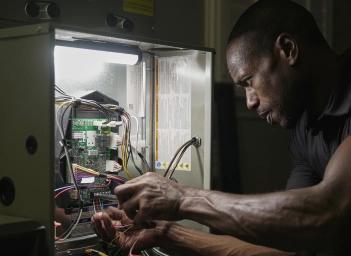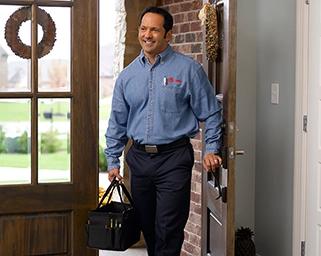Furnace vs. Boiler: What You Need to Know
Boiler vs furnace – learn the differences between these two home heating systems.
By Anne Fonda
Boilers and furnaces are both heating systems that can keep your home warm and cozy in the winter months. However, there are substantial differences between the two systems. Whether you’re building a new home or purchasing an existing home, learn what you need to know about each heating method.
What is a boiler?
An oil or gas boiler is a heating system component that burns fuel to heat water to heat your home. Known as hydronic heat, boiler heating systems use a system of water pipes and baseboard radiators, wall radiators, and radiant flooring to distribute the hot water, which then radiates heat into your home.
Boiler maintenance requirements include an annual inspection and replacement of faulty valves, pipes, or other parts. With maintenance, boilers can last up to 30 years.
Boiler heating systems are more common in the Northeast and Mid-Atlantic states in older homes as well as homes in rural areas without access to a natural gas line. If you’re buying an existing home in those areas, ask about the heating system.
What is the disadvantage of a boiler?
There are 3 main disadvantages of a boiler heating system.
- Cost Boiler installation and boiler replacement can be more expensive than furnace installation or furnace replacement because of the complexity of the system.
- Water pipes The water pipes can freeze or leak and cause water damage.
- Noise A boiler heating system can also be noisier than a furnace as the pipes and radiators heat up.
Is a boiler more expensive to run than a furnace?
Saying it costs more to run a boiler than to run a furnace is difficult. In general, it takes less fuel to heat water than it does to heat air. But fuel costs can vary greatly from state to state. Fuel oil can be more expensive than natural gas as well, so it may depend on what fuel the boiler uses to heat water.
The cost will also vary based on how efficient the unit is, what temperature you set for heating, whether you use a smart thermostat, and more.
What is a furnace?
A furnace, most commonly a gas furnace, is a component of a forced air HVAC system. The furnace burns natural gas or sometimes oil to heat a heat exchanger. Air flows over the heat exchanger, and the warm air is then forced into the duct system and out of the vents in your home.
Furnace maintenance includes an annual inspection and furnace tuneup, as well as regularly replacing the furnace filters. When well maintained, a furnace will last 15-20 years.
Most new homes in the United States include a central heating and air conditioning system. That can be a furnace + AC unit or a heat pump + air handler. According to the National Association of Homebuilders (NAHB), 99% of new home builds started in 2020 included a forced air system.
What is the advantage of a furnace versus boiler?
In general, furnace installation is less expensive than it is to install a new boiler heating system. Furnace replacement is also generally less expensive than boiler replacement.
Is it better to have a boiler or a furnace?
That depends. The biggest factor driving your decision-making will be if you are replacing an existing boiler or furnace. It will be most cost-effective to keep the existing boiler heating system or forced air system rather than converting to the other system.
Some people love the radiant heat from a boiler system. Other people are more comfortable with a traditional forced air system. It’s hard to say that one is better than the other.
For both systems, energy-efficient units are available that can reduce your energy usage and may reduce your energy costs.
What if I want air conditioning, too?
As part of a central heating and cooling system, a furnace can be easily paired with a central air conditioning unit or heat pump. The furnace distributes the cool air in the summer as well as the heated air in the winter.
If you have a boiler heating system, it cannot help to cool your home. You would need to purchase a ductless mini-split system (cooling only) or install wall or window AC units for cooling.
Do I need a boiler for radiant floor heating?
No. While a boiler heating system can include radiant floor heat, there are other ways to provide radiant flooring. During home remodeling or a new build, you can choose to use a hot water heater and piping for radiant flooring or use electric wiring and mats to provide electric radiant floor heating.
Can I convert from a boiler to a furnace?
Yes, but you will want to weigh the pros and cons of doing so. If you have access to natural gas, you can install a gas furnace and central air conditioning unit. But you will have to install ductwork at the same time. You may also need to upgrade your electrical system.
You can leave the boiler system as is, just inoperable. Or, you can choose to demolish the boiler system - but that can be labor-intensive and cost-prohibitive. Removing all of the pipes and radiators will leave holes and unpainted areas. However, if you’re planning a major renovation, this is not a major issue.
Work with an HVAC professional
If you need furnace repair or furnace replacement, reach out to your local Trane dealer. If you have a boiler heating system, a local dealer may be able to help you with boiler repairs, but if you need a boiler replacement, they will recommend a brand other than Trane, as boilers are not part of our product line.
If you are replacing a boiler or a furnace, opt for an ENERGY STAR® high-efficiency system to get higher efficiency. Look for units that qualify for federal tax credits and rebates to help offset the cost.
Anne Fonda
Content Writer, Trane Technologies
A Content Writer with Trane Technologies, Anne Fonda researches topics and writes for Trane® and associated residential HVAC brands. She works in collaboration with Trane Technologies subject matter experts, offering easy-to-understand, informative content on complex topics. Her goal is to help consumers make informed decisions on the products and services they need.
She has written for HVAC and other service provider websites for over 16 years. Before transitioning to web content writing, Anne had a 14-year stint as an award-winning journalist. She graduated cum laude from the University of Missouri-Columbia School of Journalism.
When she’s not working, Anne enjoys playing word games, reading, gardening, spending time with family, and visiting gardens and museums.
Expert review by John Kim, Senior Product Manager, Furnaces




